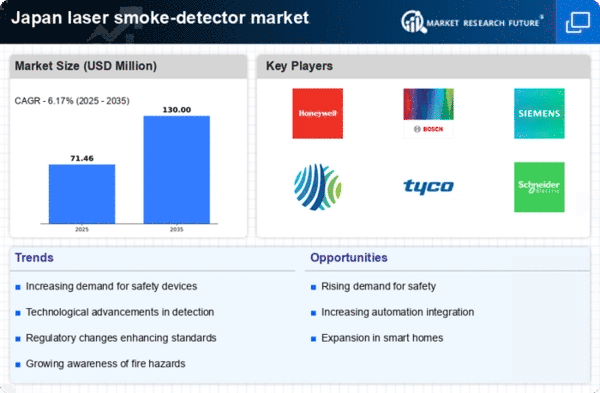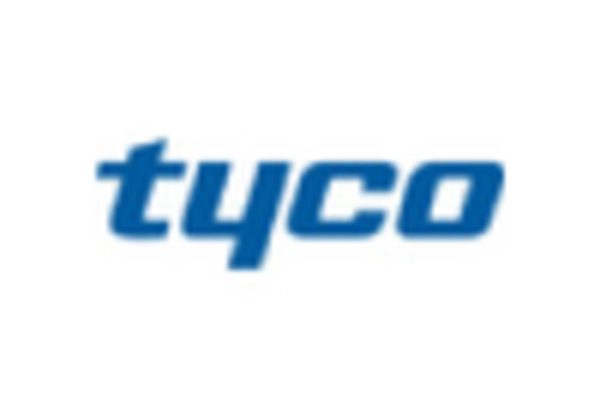Rising Awareness of Fire Safety
The increasing awareness of fire safety among consumers and businesses in Japan is driving the laser smoke-detector market. As incidents of fire-related accidents have prompted public discourse, there is a growing demand for advanced fire detection systems. Laser smoke detectors, known for their precision and reliability, are becoming a preferred choice. The market is projected to grow at a CAGR of approximately 8% over the next five years, reflecting this heightened awareness. Furthermore, educational campaigns by government agencies and fire safety organizations are likely to enhance consumer knowledge about the benefits of laser smoke detectors, thereby expanding the market. This trend indicates a shift towards prioritizing safety measures in both residential and commercial sectors, which could lead to increased adoption of laser smoke detectors.
Government Initiatives and Support
Government initiatives aimed at improving fire safety standards are playing a crucial role in the growth of the laser smoke-detector market. In Japan, regulatory bodies are increasingly mandating the installation of advanced fire detection systems in both residential and commercial buildings. This regulatory push is likely to create a favorable environment for the adoption of laser smoke detectors. Additionally, financial incentives and subsidies for upgrading fire safety equipment may further stimulate market growth. The laser smoke-detector market could see an increase in installations as compliance with these regulations becomes a priority for property owners. This trend indicates a proactive approach by the government to enhance public safety, which is expected to drive demand for advanced fire detection technologies.
Urbanization and Infrastructure Development
The rapid urbanization and infrastructure development in Japan are contributing to the expansion of the laser smoke-detector market. As cities grow and new buildings are constructed, the need for effective fire safety measures becomes increasingly critical. Laser smoke detectors, with their high sensitivity and low false alarm rates, are well-suited for modern architectural designs. The market is likely to benefit from the construction of high-rise buildings, commercial complexes, and industrial facilities, all of which require reliable fire detection systems. According to recent estimates, the construction sector in Japan is projected to grow by approximately 5% annually, which could lead to a corresponding increase in the demand for laser smoke detectors. This trend suggests that the market will continue to thrive as urban development progresses.
Technological Innovations in Detection Systems
Technological innovations are significantly influencing the laser smoke-detector market in Japan. The introduction of advanced features such as real-time monitoring, remote alerts, and integration with smart home systems is enhancing the appeal of laser smoke detectors. These innovations not only improve detection accuracy but also provide users with greater control and convenience. The market is expected to witness a surge in demand as manufacturers invest in research and development to create more sophisticated detection systems. For instance, the incorporation of artificial intelligence and machine learning algorithms into smoke detection technology is likely to further refine the performance of laser smoke detectors. This trend suggests that the market will continue to evolve, driven by the need for more effective and user-friendly fire safety solutions.
Increased Focus on Environmental Sustainability
The growing emphasis on environmental sustainability is influencing the laser smoke-detector market in Japan. Consumers and businesses are increasingly seeking eco-friendly fire detection solutions that minimize environmental impact. Laser smoke detectors, which often utilize less energy and have longer lifespans compared to traditional detectors, align well with these sustainability goals. This shift in consumer preference is likely to drive manufacturers to develop more environmentally friendly products, potentially expanding the market. Furthermore, as Japan continues to pursue its sustainability objectives, the demand for energy-efficient fire safety solutions may rise. This trend indicates a broader movement towards integrating sustainability into safety technologies, which could reshape the landscape of the laser smoke-detector market.
















